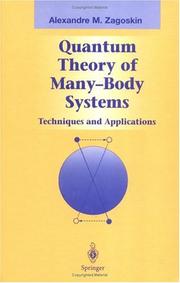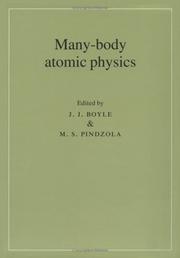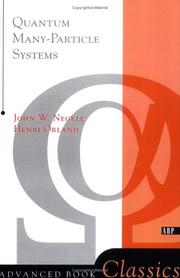| Listing 1 - 4 of 4 |
Sort by
|
Book
ISBN: 0511470797 Year: 1998 Publisher: Cambridge : Cambridge University Press,
Abstract | Keywords | Export | Availability | Bookmark
 Loading...
Loading...Choose an application
- Reference Manager
- EndNote
- RefWorks (Direct export to RefWorks)
This introduction to the field of many-body atomic physics is suitable for researchers and graduate students. Drawing from three major subject areas, atomic structure, atomic photoionization, and electron-atom collisions, this book begins with an introduction to many-body diagrams, and continues with several chapters devoted to each subject area written by leading theorists in that field. Topics in atomic structure include the relativistic theory for highly charged atomic ions and calculations of parity nonconservation. Topics in atomic photoionization include single and double photoionization processes, and photoelectron angular distributions. Topics in electron-atom collisions include the theory of electron impact ionization, perturbation series methods, target dependence of the triply differential cross section, Thomas processes, R-matrix theory, close coupling, and distorted-wave theory. This coherent and carefully edited volume has been prepared by leading atomic physicists as a tribute to Hugh Kelly, one of the pioneers of many-body theory.

ISBN: 0387983848 Year: 1998 Publisher: New York (N.Y.) : Springer,
Abstract | Keywords | Export | Availability | Bookmark
 Loading...
Loading...Choose an application
- Reference Manager
- EndNote
- RefWorks (Direct export to RefWorks)
Intended for graduate students in physics and related fields, this text is a self contained treatment of the physics of many-body systems from the point of view of condensed matter. The approach, quite traditionally, uses the mathematical formalism of quasiparticles and Green's functions. In particular, it covers all the important diagram techniques for normal and superconducting systems, including the zero- temperature perturbation theory, and the Matsubara, Keldysh, and Nambu -Gor'kov formalisms. The aim is not to be exhaustive, but to present just enough detail to enable the student to follow the current research literature or to apply the techniques to new problems. Many of the examples are drawn from mesoscopic physics, which deals with systems small enough that quantum coherence is maintained throughout their volume, and which therefore provides an ideal testing ground for many-body theories. The book begins by introducing the Green's function for one-particle systems (using Feynman path integrals), general perturbation theory, and second quantization. It then turns to the usual zero-temperature formalism, discussing the properties and physical meaning of the Green's function for many-body systems and then developing the diagram techniques of perturbation theory. The theory is extended to finite temperatures, including a discussion of the Matsubara formalism as well as the Keldysh technique for essentially nonequilibrium systems. The final chapter is devoted to applications of the techniques to superconductivity, incuding discussions of the superconducting phase transition, elementary excitations, transport, Andreev reflections, and Josephson junctions. Problems at the end of each chapter help to guide learning an to
Green's functions. --- Many-body problem. --- Quantum theory. --- Superconductivity.

ISBN: 0521470064 Year: 1998 Publisher: Cambridge, UK ; New York, NY, USA : Cambridge University Press,
Abstract | Keywords | Export | Availability | Bookmark
 Loading...
Loading...Choose an application
- Reference Manager
- EndNote
- RefWorks (Direct export to RefWorks)

ISBN: 0738200522 Year: 1998 Publisher: Reading, Mass. Perseus
Abstract | Keywords | Export | Availability | Bookmark
 Loading...
Loading...Choose an application
- Reference Manager
- EndNote
- RefWorks (Direct export to RefWorks)
Quantum mechanics. Quantumfield theory --- Degree of freedom. --- Integration, Functional. --- Many-body problem. --- Quantum theory. --- Stochastic processes.
| Listing 1 - 4 of 4 |
Sort by
|

 Search
Search Feedback
Feedback About UniCat
About UniCat  Help
Help News
News